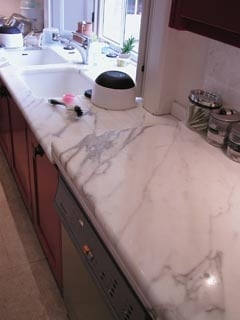Ask the Expert : marble worktops
A customer wants a marble worktop rather than granite or engineered quartz. What do you think I should do?
Marble counter tops used to be regularly featured in many kitchen shops in the UK. In fact, it wasn’t so long ago that the British stone industry didn’t want to know about granite because it was too difficult (ie slow and expensive) to work. Diamond abrasive technology has changed that and now people don’t want to work marble because it is too easily scratched and stained.
There was also a (wrong) perception that marble is not hygienic because when it stains, which it does, it harbours foodstuffs. I have never seen any evidence to support this.
Marble is a relatively soft stone that can be scratched quite easily by the use of knives and other metal implements and, being calcium carbonate, is also susceptible to acidic dissolution from liquids such as lemon juice, red wine, carbonated drinks and vinegar, which can lead to staining effects as well as removing the shine and etching the surface.
Regardless of the problems that can affect marble, it ages gracefully so that the stains, scratches and other effects build up and slowly meld into an overall, more even appearance and a patina develops. If you understand how marble behaves and are prepared to wait for the rewards, there are no reasons not to use it for kitchen worktops.
Of course, not everyone wants the aged look. Some people would just think of it as tired-looking and not in keeping with many modern finishes that are often rather sterile by comparison.
If you are going to have a working kitchen rather than just a showpiece and want marble, it might be better to have a honed rather than polished finish, so scratches will not show up so readily. However, a honed finish will be considerably more susceptible to staining and some form of protection is advisable.
Much of the process of marble ageing is actually from the absorption of oils, which eventually help to resist stains, and a treatment such as boiled linseed oil or beeswax could be a simple way to provide good protection. Oils and waxes also help to reduce the effects of scratching. However, only natural oils and waxes should be used and mineral and other oils that should not be ingested in any quantity must be avoided on any areas where food is prepared.
Stone soap and other well known stone treatments could also be applied but may need more regular re-treatment than might be expected with granite or engineered quartz.
Stone Federation Great Britain’s guide for the installation of natural stone kitchen worktops* is rather limited on the subject of marble. It considers it unsuitable for kitchen worktops, bar tops and servery tops and only suitable with care for counter tops, restaurant tables and reception desks.
This is generally good advice to avoid disappointment by the customer that can lead to disputes if the ageing process has not been clearly and openly discussed in advance. But really it undermines the traditional use of a wonderful material. I see no reason for the well informed not to use marble, though you may have to get your customer to sign a disclaimer saying they understand how it will age before you agree to install it.
*Natural Stone Kitchen Worktops. Code of practice for the design, manufacture, installation and maintenance of natural stone kitchen worktops – including reception desks, counter tops and similar horizontal and associated vertical surfaces for use in domestic and commercial situations. Published by Stone Federation Great Britain, February 2005.
Barry Hunt is a Chartered Geologist and Chartered Surveyor who has spent 20 years investigating issues relating to natural stone and other construction materials. He now runs IBIS, an independent geomaterials consultancy undertaking commissions worldwide to provide consultancy, inspection and testing advice. Tel: 020 8518 8646.
The advice offered in answer to readers’ questions is intended to provide helpful insights but should not be regarded as complete or definitive. Professional advice should always be sought with all stone-related issues as each problem will inevitably have its own unique set of circumstances.

